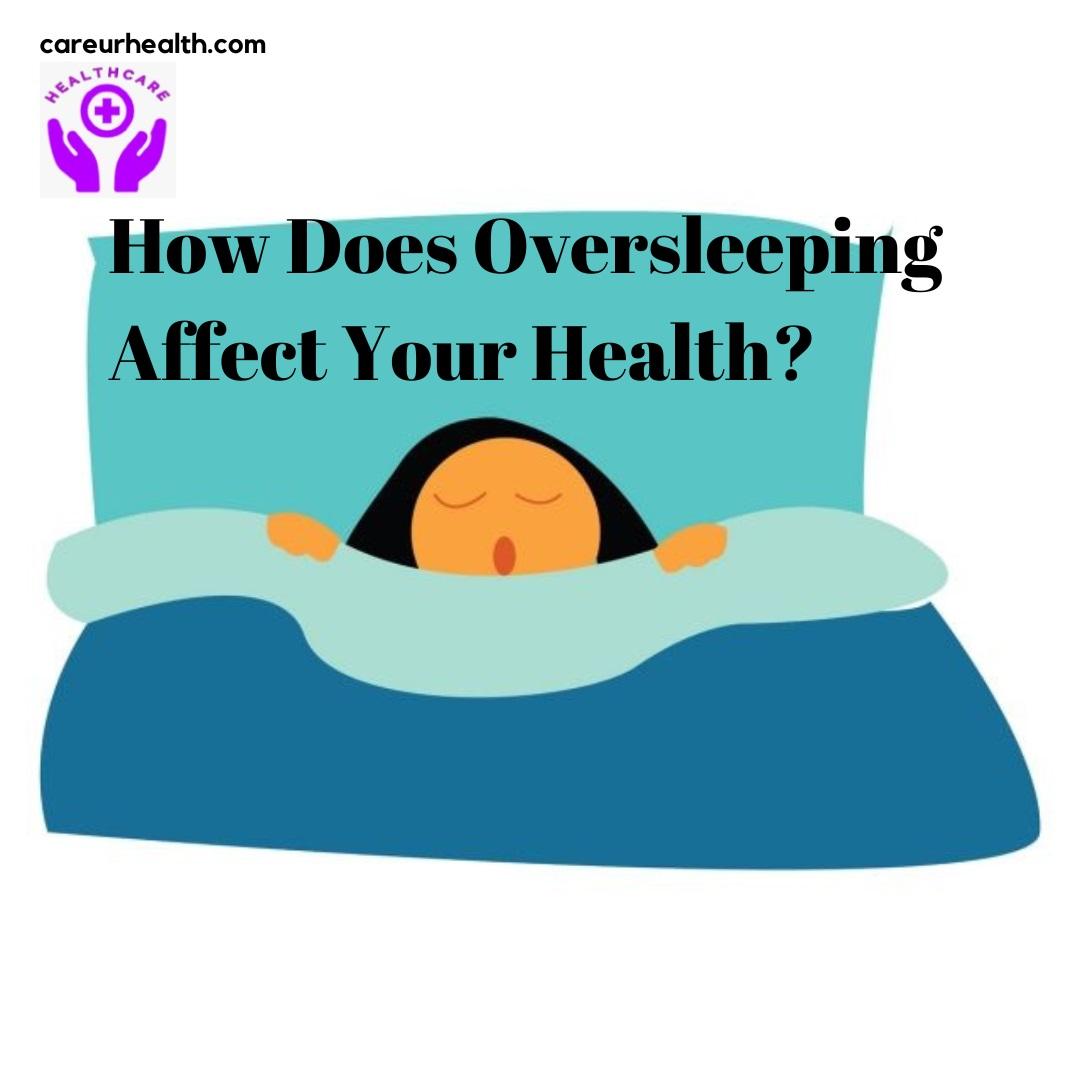For many people, oversleeping may seem like a dream come true in today’s fast-paced society when sleep is frequently valued highly.
Who doesn’t want to spend leisurely Sunday mornings curled up in bed as the light softly peeps through the curtains, tempting them to stay there for a little while longer?
Although splurging on additional sleep on occasion might be a soothing pleasure, an increasing amount of evidence indicates that extended periods of oversleeping may negatively impact your health and overall well-being.
The fascinating topic of how oversleeping affect your health is explored in this essay. The effects of sleep deprivation have dominated sleep science for years, but the implications of sleeping too much are as important. It’s time to bring attention to this frequently disregarded part of our sleeping patterns.
“We will examine the many aspects of oversleeping, including its probable origins and the complex connection between prolonged sleep and mental, emotional, and physical health.”
We’ll also look at the warning signs that could indicate a need for intervention, as well as the thin line that separates a rejuvenating night’s sleep from oversleeping.

Thus, if you’ve ever questioned if getting more sleep is a good thing or a bad thing, this article will bring you important insights into the complex world of sleep and explain how getting too much sleep might harm your health.
1. Obesity
How does oversleeping affect your health? The contribution of excessive sleep to weight gain and obesity is one major effect. How does oversleeping affect your health in this regard? In other words, it throws off the delicate equilibrium of physiological systems that control metabolism and hunger.
Your body’s natural circadian rhythm is upset when you oversleep, which impacts the chemicals leptin and ghrelin, which are involved in appetite and fullness. Increased food consumption, particularly of high-calorie, low-nutrient meals, may result from this disturbance and may cause weight gain.
Therefore, How does oversleeping affect your health concerning obesity? It’s a vicious cycle: being overweight may make sleep issues worse, which creates a negative feedback loop. Furthermore, sleeping too much typically leads to sedentary behaviour, which exacerbates weight gain.
People who have these variables together are more likely to experience the health consequences of obesity, such as diabetes and cardiovascular disease. Oversleeping has negative long-term effects on your health, particularly when managing your weight.
Maintaining a nutritious diet and frequent exercise, in addition to striking a balance in your sleep habits, will help lessen the negative impacts on your body weight and general well-being.
2. Diabetes
How does oversleeping affect your health? Oversleeping has been linked to an increased risk of type 2 diabetes, which is one of the major health issues. In this situation, How does oversleeping affect your health? It upsets the delicate hormonal and metabolic balance of the organism.
Consistently sleeping too much interferes with your body’s capacity to control blood sugar levels. This is a significant contributing factor to the onset of diabetes.
- How does oversleeping affect your health in the context of a possible diabetes risk? It seems that both parties are in the relationship. Diabetes can cause excessive daytime drowsiness, which can make people need to rest for extended periods of time.
- Conversely, too much sleep might affect how well the body uses insulin and metabolizes glucose. Oversleeping affect your health by throws off circadian rhythms, which exacerbates insulin resistance, a characteristic of type 2 diabetes.
It sets up a vicious cycle in which diabetes increases the risk of oversleeping, which can then lead to even more oversleeping. It emphasizes how critical it is to preserve a healthy sleep-wake cycle for general health and well-being, especially in light of metabolic diseases like diabetes.
3. Cardiovascular Health
How does oversleeping affect your health? Its influence on cardiovascular health is an important factor to take into account. In this case, how can oversleeping impact your health?
The body’s circadian rhythms, which are essential for controlling many physiological functions, including the cardiovascular system, can be upset by extended periods of excessive sleep.
- Regarding cardiovascular issues, How does oversleeping affect your health? It could raise one’s risk of stroke and heart disease.
- An imbalance in the body’s internal clock can result from irregular sleep habits, including oversleeping, this can influence the release of hormones that control heart rate and blood pressure. Heart disease risk factors such as inflammation and hypertension may result from this imbalance.
- Furthermore, sleeping too much can lead to sluggishness and decreased exercise, both of which can worsen cardiovascular problems. Weight gain and a decline in general fitness can result from sedentary behaviour coupled with excessive sleep.
Concerning physical inactivity, “How does oversleeping affect your health”? It may exacerbate cardiac issues and obesity-related diseases.
To sum up, How does oversleeping affect your health with respect to heart health? In addition to upsetting circadian rhythms and causing hormone imbalances, it can also encourage sedentary behaviour and raise the risk of heart disease and stroke.
These risks can be reduce and general cardiovascular health can be supportive by maintaining a balanced sleep schedule and leading a healthy lifestyle.
4. Backpain
How does oversleeping affect your health? Because of the prolonged periods of inactivity that come with oversleeping, back pain can be caused by oversleeping affect your health.
The back and neck might become stiff and uncomfortable from prolonged bed rest, or in this case, from staying in bed for a longer period because of oversleeping.
How does oversleeping affect your health? Understanding that the human body is made for movement and balance is necessary to link. Joint and muscular strain can result from a sedentary lifestyle, even if it’s accidental because of oversleeping.
Inactivity can cause tight joints, atrophy of the muscles, and poor circulation, particularly in the back and neck. These physical side effects may include pain and dull pains in these regions, among other discomforts.
Although sleep is necessary for healing and restoration, too much sleep can upset the body’s natural balance between exercise and relaxation.
Finding a balance in your sleep habits is essential for maintaining a healthy musculoskeletal system. Oversleeping affect on our health regularly can result in a vicious cycle of discomfort and inactivity, therefore it’s important to address and break any bad habits related to excessive sleeping.
5. Headaches
How does oversleeping affect your health? The possibility of headaches is one of the negative significant of oversleeping affect on your health. A headache may occur as a result of oversleeping, which is frequently interpreting as a type of irregular sleep pattern that alters the neurotransmitters in the brain.
This happens as a result of “sleep inertia,” a condition in which people wake up from a prolonged sleep feeling groggy. Atypical neurotransmitter fluctuations, including but not limited to serotonin and dopamine, can occur during this phase.
“How does oversleeping affect your health? These neurotransmitter imbalances have the potential to increase the brain’s sensitivity to pain and discomfort in the setting of headaches, ultimately leading to headache episodes.”
Moreover, getting too much sleep can occasionally result in dehydration, which is another prevalent cause of headaches. The prolonged time spent sleeping without drinking water can lead to dehydration, particularly if it is coupled with excessive perspiration or inadequate hydration the day before.
Conclusion
Oversleeping—an often-ignored part of good sleep hygiene—may potentially cause dehydration and change neurotransmitter levels, both of which can lead to headache development.
To encourage healthier sleeping practices and lessen the negative health impacts of excessive sleep, it might be quite helpful to comprehend these subtleties in the link between headaches and sleep length.
In conclusion, we should think about and pay attention to the effects that oversleeping affect has on our health. Although getting enough sleep is important for our health, getting too much sleep might have negative effects.
The several ways that oversleeping impairs our physical and mental well-being have been covered in this article.
First and foremost, there is evidence connecting excessive sleeping to an increased risk of long-term health issues like diabetes, heart disease, and obesity.
“Decreased physical activity and disturbances in metabolic processes are the causes of these concerns. Moreover, sleeping too much can lower cognitive function, resulting in drowsiness, memory issues, and poor decision-making abilities.”
Psychological Effect
The effect on psychological well-being is also noteworthy. Oversleeping affect your health by upset the delicate neurotransmitter balance in the brain, which is link to increasing risk of anxiety and sadness. This might lead to emotional fluctuations and a reduced standard of living.
- Essentially, when it comes to sleep, moderation is crucial. Although everyone has a different optimal sleep duration, it is usually advised to strive for 7-9 hours of high-quality sleep per night.
- People should strive to find the correct balance in their sleep habits and be aware of them to maintain a healthy lifestyle. Ignoring oversleeping has effects can seriously affect our general well-being, thus it should not be done. Thus, prioritizing a regular and healthy sleep schedule is essential.
Read Also:-
- Top 10 Meditation Apps to Help You Find Inner Peace
- 6 Energising Yoga to Begin Your Day with a Positive Attitude
- The Best Morning Walk Tips for Weight Loss
FAQs on how oversleeping affects your health
Indeed, sleeping too much at night may lead to several health problems.
Depression, low energy, and cognitive impairment can result from oversleeping.
Indeed, it can interfere with metabolism and cause weight gain.
Yes, for certain people, getting too much sleep can cause headaches.
Indeed, it might make heart disease and stroke more likely.
Mood fluctuations and decreased motivation might be caused by oversleeping.
Indeed, there is a link between it and a higher risk of type 2 diabetes.
Memory problems and cognitive decline can result from oversleeping.
The immune system’s reaction may be weak by too much sleep.
Indeed, it can cause health issues by interfering with the circadian cycle.










